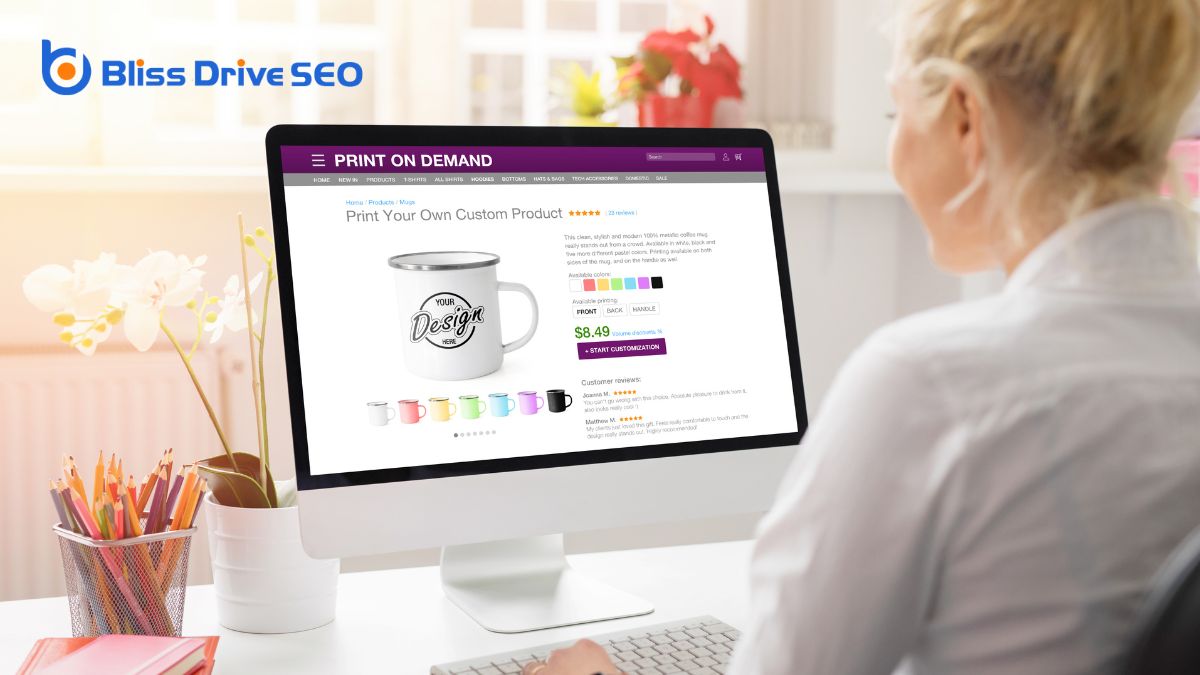Digital Marketing Services
Learn More About Us

Focusing on new product keywordsWords or phrases that users type into search engines to find information. for eCommerce SEO is crucial because it enhances your site's visibility and attracts more organic trafficVisitors who come to a website through unpaid search engine results.. Using pertinent, popular keywords in your product titles and descriptions aids search engines in comprehending your offerings more effectively, boosting click-through rates. Optimized titles with these keywords also make your content more captivating, improving user experience and boosting conversions. Consistently refreshing keywords maintains your site's competitiveness and attractiveness to both search engines and customers. To learn more about efficiently utilizing new product keywords, continue exploring strategies to optimize and stay ahead in eCommerce SEO.

A key aspect of ecommerce SEO is understanding the importance of product keywords. By strategically placing product keywords in your titles, you can significantly boost your site's visibility in search engine results. This not only enhances your SEO but also helps potential customers easily find what they're looking for, improving their user experience.
When users see relevant product keywords in titles, it immediately clarifies what the product is about, which increases click-through rates. This clear communication is vital for turning visitors into buyers, thereby increasing your conversion rates.
Optimizing your product titles with fresh, trending keywords can attract more organic traffic to your ecommerce site.
To boost your new product's visibility, crafting compelling SEO page titles is essential. These titles directly impact click-through rates and search engine performance. Using tools like SEOPro can help you get real-time recommendations for optimizing your titles and driving more traffic to your product pages.
Crafting compelling SEO titles is a vital strategy for boosting your ecommerce store's visibility in search results. Your SEO page title is one of the first things both search engines and users see, so it's essential to get it right. Aim for 50-60 characters to guarantee your titles display correctly in search results. Start with thorough keyword researchThe process of finding and analyzing search terms that people enter into search engines. to identify primary keywords, placing them near the beginning of your page title for better search engine recognition.
Using powerful words and emotional triggers can make your titles more engaging and clickable. For example, words like "exclusive," "limited time," or "best-selling" can attract more attention.
Don't forget to differentiate your product titles from competitors by making them unique and descriptive. This distinctiveness not only attracts your target customers but also improves your page SEO by highlighting what sets your products apart.
A/B testingA method of comparing two versions of a web page or app against each other to determine which one pe... different SEO titles will help you determine which ones perform best. Utilize the insights from these tests to refine your approach continuously. Additionally, incorporating internal links with optimized anchor textThe clickable text in a hyperlink, important for SEO as it provides context for the linked page. can further enhance your SEO efforts, driving more traffic to your product pages.
Maximizing your SEO titles is just the start; improving click-through rates (CTR) is where you can witness tangible outcomes. By concentrating on product keywords in your SEO page titles, you can enhance CTR by up to 36%. When you utilize new, pertinent keywords, your e-commerce website's presence in search results grows, naturally leading to more clicks.
A/B testing different SEO page titles with fresh product keywords can assist you in identifying the most efficient combinations. This method enables you to observe which titles draw the most organic traffic, allowing you to refine your strategy for the best outcomes.
Updated SEO page titles with trending keywords guarantee your content remains relevant and attractive to search engine users, which is essential for sustaining high click-through rates.
Consistently updating your SEO page titles with new product keywords isn't just about staying current; it's about staying competitive. In the ever-changing realm of e-commerce, maintaining your content that is current and captivating can make all the distinction. By doing this, you're not just enhancing visibility; you're also directing more targeted traffic to your site, ultimately boosting your e-commerce success.
Imagine having a tool that instantly tells you how to make your SEO page titles more effective—real-time optimization tools like SEOPro do just that. By using SEOPro, you can get immediate feedback on your SEO page titles, enabling you to make adjustments that improve search engine visibility. This real-time optimization is vital, as it helps you craft compelling titles with the right keywords, increasing your click-through rates and driving more traffic to your site.
SEO page titles are essential for attracting users from search results. They serve as the first impressionWhen an ad is displayed on a user’s screen. potential customers have of your page. With SEOPro, you receive real-time recommendations on how to optimize these titles, ensuring they include relevant keywords and are engaging enough to entice clicks.
By focusing on keyword optimization, you not only make your titles more attractive but also enhance your overall search engine performance.
Improving your SEO page titles through tools like SEOPro can greatly boost your search engine visibility. This means more eyes on your products and, ultimately, more conversions. Don't underestimate the power of a well-optimized title—start using real-time optimization tools to stay ahead in the competitive ecommerce landscape.
When optimizing for ecommerce, you'll find that product titles and SEO titles serve different but complementary roles.
Your product title, as the H1 heading, should include essential keywords for SEO, while SEO titles need to be crafted to grab attention and boost click-through rates.
Balancing these elements guarantees both search engine visibility and user engagementThe level of interaction and involvement users have with social media content..
Although often overlooked, the significance of product titles in ecommerce SEO can't be emphasized enough. Product titles act as the H1 heading on your product pages, playing a vital role in SEO optimization. When you craft product titles, make sure they're clear, descriptive, and packed with relevant keywords. This improves visibility and makes it easier for search engines to identify and rank your products.
Product titles are crucial for SEO optimization. They act as the H1 heading on your product pages, enhancing visibility and search engine ranking. Ensure your product titles are clear, descriptive, and keyword-rich to maximize their impact.
SEO page titles, on the other hand, are what potential customers see in search results. They're essential for improving click-through rates. While they also need to contain relevant keywords, the focus should be on capturing the user's attention.
SEO page titles are vital for enhancing click-through rates. They should contain relevant keywords but prioritize capturing the user's attention to increase the likelihood of clicks. A well-optimized SEO page title can make the distinction between a user clicking on your link or scrolling past it.
Balancing SEO title strategy between product titles and SEO page titles is crucial for effective ecommerce SEO. Your product title acts as the H1 heading on the product page, a critical element for SEO. It's designed to make sense to users, providing clear and concise information about the product. Think of it as the primary descriptor in your product descriptionsDetailed information about a product, including features, benefits, and specifications. that addresses what customers are searching for.
On the other hand, the SEO page title appears in search results, greatly influencing click-through rates. Crafting compelling SEO page titles with relevant keywords ensures your product shows up in the right search query. This is where you can focus on search engine visibility, incorporating keywords that mightn't fit naturally into the product title but are crucial for ranking.
To maximize visibility and user engagementThe interactions that users have with a brand’s content on social media., both titles need to be optimized. Use internal linkingLinks that connect different pages on the same website. to connect your product pages, making sure that the SEO title drives traffic effectively.
Also, consider incorporating customer reviews to add credibility and attract more clicks. Remember, the title and meta descriptions should work together seamlessly, drawing potential customers from search engines to your product pages efficiently.
Crafting effective SEO titles involves more than just good keyword placement; it requires a distinct optimization focus tailored to both product and SEO page titles. The product title serves as the H1 heading on your product page and is essential for SEO optimization. It should be clear, descriptive, and ideally include the main keyword. This clarity helps search engines understand your content, making it more accessible to potential customers.
On the other hand, SEO page titles appear in search results and directly influence click-through rates. These titles need to grab attention while still incorporating important keywords. By optimizing both, you guarantee that your content is appealing to both users and search engines.
Consider the emotional impact of well-crafted titles:
Balancing the specificity of product titles with the engaging nature of SEO page titles can greatly boost your online store's performance. By focusing on both, you're not just optimizing for search engines but also enhancing user experience, ultimately driving more traffic and sales.

When it comes to improving search visibility for your ecommerce store, identifying and leveraging new product keywords is vital. These keywords can target specific customer needs and preferences, allowing you to optimize your product pages effectively. To boost organic traffic, it's important to include keywords that not only describe your products but also align with what your potential customers are searching for.
Long-tail keywords are particularly valuable in this scenario. They're more specific and less competitive, making it easier for your ecommerce store to rank higher in search results. By incorporating these into your product descriptions, titles, and meta tagsHTML tags that provide information about a web page to search engines and visitors., you enhance your SEO performance. This way, your products become more visible to a targeted audience that's likely to convert.
Regularly researching and implementing fresh keywords keeps your website competitive in search engine rankings. Consumer trends evolve, and your keyword strategies should adapt accordingly. By staying updated with trending keywords, you guarantee your product pages remain relevant and visible. This ongoing effort not only attracts more visitors but also improves your chances of turning them into paying customers. Ultimately, focusing on new product keywords is a reliable way to boost your ecommerce store's search visibility.
To effectively identify the right keywords for your ecommerce store, it's essential to leverage robust keyword research tools like SEMrush or Ahrefs. These tools help you uncover high-search volume terms that resonate with your target audience. Start by analyzing the search volume, competition, and relevance of potential keywords to verify they align with your products.
When conducting keyword research, consider focusing on long-tail keywords. These phrases are more specific and less competitive, making it easier to rank them. Long-tail keywords are particularly useful for product variations or niche markets, allowing you to capture highly targeted traffic.
Additionally, keep an eye on trending keywords related to your industry or seasonal products. By integrating these into your strategy, you can capitalize on current consumer interests and boost your visibility during peak times.
Regularly update your keyword lists to adapt to changes in search trends and customer behavior. Staying proactive in your keyword identification strategies will help you maintain a competitive edge in the ever-changing ecommerce landscape.
To enhance your e-commerce site's visibility, make sure you include pertinent new product keywords in your titles, headings, and descriptions.
Craft compelling product descriptions that not only engage potential buyers but also incorporate these keywords naturally.
Don't forget to optimize your meta descriptions with fresh keywords to improve your click-through rates.
Optimizing your product pages with relevant keywords is crucial for enhancing search engine visibility and attracting potential customers. By focusing on new product keywords, you can target specific customer search queries, making your items more discoverable on Google Search. Start by integrating keyword-rich product titles and product descriptions to enhance your SEO performance and drive organic traffic. This strategic approach guarantees that your content stays fresh and engaging.
Utilizing structured data can also elevate your product pages, making them more favorable to search engines. When your pages are well-optimized, they appear more relevant to users' searches, increasing the likelihood of click-throughs and conversions.
Here's why you should include relevant keywords:
Crafting compelling product descriptions is a game-changer for optimizing your ecommerce pages. These descriptions play a pivotal role in elevating your SEO performance. When you incorporate relevant keywords into your product descriptions, search engines are more likely to rank your pages higher, making them more visible to potential customers.
But it's not just about SEO. Detailed and persuasive product descriptions markedly enhance customer understanding of your product's features and benefits. This clarity can directly impact your conversion rates, potentially increasing them by up to 30%. When customers clearly understand what they're buying, they're more likely to complete a purchase.
Moreover, optimized product descriptions improve user experience. Clear, concise, and engaging descriptions keep users on your site longer, reducing bounce rates and driving higher engagement.
Your goal should be to use a persuasive tone that not only informs but also convinces the customer that your product is the best choice.
Meta descriptions serve as the brief yet impactful summaries that appear under your page titles in search engine results. They play a pivotal role in grabbing the attention of potential customers and improving click-through rates. By crafting optimized meta descriptions for each product page, you can greatly enhance user engagement and drive targeted traffic to your site.
To make your meta descriptions effective:
When you focus on these elements, your meta descriptions become not just informative but also persuasive. They should give users a clear idea of what they'll find on your product page, enticing them to click through and explore further.
When you update your product descriptions regularly, it signals content freshnessThe relevance and recency of content on a web page. to search engines, which can greatly enhance your SEO. Fresh content is a magnet for search engine crawlers, guaranteeing that your site gets indexed more frequently. This can leadA potential customer referred by an affiliate who has shown interest in the product or service but h... to better search rankings, putting your products in front of more potential customers. By updating regularly, you're showing search engines that your site is active and relevant, which is vital for maintaining visibility.
Consistent updates to your product descriptions not only help in attracting crawlers but also demonstrate to users that your site is trustworthy and up-to-date. Google favors fresh content, so making these updates can have a significant impact on your search visibility. This isn't just about SEO; it's also about providing a better user experience.
Nobody wants to read thin or outdated content, and keeping your product descriptions fresh can enhance user engagement and trust.
In short, focusing on content freshness by consistently updating your product descriptions is an effective strategy. It keeps search engines happy and guarantees that your customers are always seeing the most current and relevant information about your products.

Visual contentImages, videos, and other visual elements used to engage users and improve conversion rates.content optimizationImproving content to enhance its performance and effectiveness., beyond boosting aesthetic appeal, plays a pivotal role in enhancing your ecommerce SEO strategy. When you optimize the images on your product pages, you're not just making them look good; you're driving a 94% increase in views. This is essential because 67% of consumers find detailed images more important than product information or customer ratings.
Visual content optimization involves adding alt textDescriptions added to images to help search engines understand the content of images. to your images. Alt text isn't just for accessibility; it helps search engines understand your visuals, which can improve organic traffic by up to 12%. This means more potential customers find your products through search engines.
By optimizing your visual content, you're also enhancing the user experience on your site. Engaging visuals can captivate visitors, reduce bounce rates, and encourage them to explore more of your offerings.
Here's why you should care about visual content optimization:
Engaging multimedia content, such as product videos and interactive images, is a game-changer for eCommerce sites. By incorporating these elements, you can significantly enhance user engagement on your product pages.
Product videos provide a dynamic way to showcase the features and benefits of your items, making it easier for customers to visualize and understand them. This not only enriches the customer experience but also contributes to higher conversion rates.
Interactive images, like 360-degree product views or virtual try-ons, further engage users by allowing them to interact with your products in a meaningful way. These interactive elementsElements that require user interaction, such as buttons, forms, and sliders. can lead to increased time spent on your pages, which is a positive signal to search engines and can improve your site's visibility.
Moreover, optimizing your multimedia content for search engines can drive more traffic to your product pages. Videos, in particular, are highly favored by search algorithms, and having well-optimized product videos can enhance your SEO efforts.
Building trust and credibility is essential for the success of your eCommerce site. When customers feel confident in your brand, they're more likely to make purchases and become repeat buyers. To build trust, start by incorporating trust badges on your site. Studies show that trust badges can increase conversion rates by up to a large extent. They reassure customers that their transactions are secure and that your site is reliable.
Another powerful tool is customer reviews. Did you know that 88% of consumers trust online reviews as much as personal recommendations? Displaying customer reviews can increase your sales by up to a considerable percentage. Positive testimonials and reviews notably boost consumer trust, with 72% of consumers saying they increase their confidence in a business.
Consider these elements to build trust and credibility:
Including social proof elements like user-generated content not only enhances credibility but also provides a more authentic, relatable shopping experience. By leveraging these strategies, you can build a trustworthy and credible eCommerce site that attracts and retains customers.
You need keywords in SEO because they help search engines understand your content, improving visibility. By strategically using them, you'll boost organic traffic and attract the right audience, ultimately enhancing your website's performance and customer reach.
Keyword research is essential for ecommerce content because it helps you understand what your customers are searching for. By optimizing for these terms, you can improve your visibility, drive more traffic, and boost your sales.
SEO is essential for ecommerce because it drives organic traffic, increases visibility, and boosts conversion rates. You'll attract more customers, outshine competitors, and build credibility, leading to long-term growth and cost-effective marketing for your online business.
You should focus on product tags because they improve SEO by providing search engines with more information about your products. Tags make it easier for users to find related items, enhancing navigation and increasing engagement and conversions.
Focusing on new product keywords enhances your eCommerce SEO by improving search visibility and driving targeted traffic. By optimizing SEO page titles and incorporating fresh, engaging multimedia content, you'll keep your site relevant and appealing. Don't overlook visual content optimization, as it builds trust and credibility with potential customers. Use effective keyword identification strategies to stay ahead of competitors and guarantee your products get the attention they deserve. Keep your content fresh and your audience engaged.
